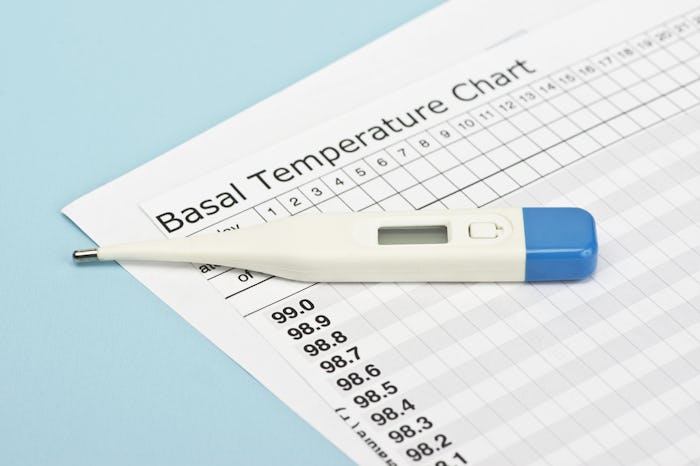Life

Everything You Need To Know About Charting Your BBT, According To Experts
Doctors generally only give one piece of advice to women hoping to get pregnant, according to a review study in Facts, Views & Vision, and I bet you already know what it is: have sex, and lots of it. Sure, having sex in a regular pattern will eventually lead to sex that falls within your fertile window, but wouldn't it be even better if you knew when those fertile days were coming? If you could, I don't know, predict them somehow? In fact, you try charting — but it's far from perfect. So does charting increase your chances of getting pregnant each month? Generally, you can track your cervical mucus, make use of ovulation prediction kits (OPKs), or chart your basal body temperature (BBT) to help identify your fertile days. But what do experts say about charting that temperature?
"1986, the year that OPKs came out, was the last time I asked anyone to do BBT monitoring," says Dr. Laurence Jacobs, of Fertility Centers of Illinois. In fact, no doctor at that center advises taking your temperature to increase your chances of conceiving. Why? While charting can give you a picture of when you ovulate, it's a picture of your past — not your present or future. Unfortunately, by the time you clock that tell-tale rise in your temperature, you've already ovulated, and your fertile window has closed.
Luckily, there are other, more effective methods to track your fertility when you're trying to conceive. Dr. Hirshfeld-Cytron of Fertility Centers of Illinois explains to Romper:
"Once your temperature has increased, that means you have already ovulated ... I recommend ovulation prediction kits (OPKs) over taking a basal body temperature. Basal body temperature provides historical information (i.e., that you already ovulated) and kits tell you when you will ovulate (i.e., peak days to have intercourse)."
You can use a chart to guess when you're likely to be fertile next month, but it's just that — a guess. Authors of the review study on fertility awareness methods (which exlcuded OPKs) printed in Facts, Views & Vision, found that tracking cervical mucus was more effective than charting for women trying to get pregnant. For those who don't feel like getting up close and personal with cervical mucus, though, OPKs are an accurate, easy way to identify fertile days with no mess, no temping, and no graph paper. Better yet, OPKs are highly accessible, and you can find them in the family planning aisle of your local drugstore.
While not the best way to increase your chance of conception each month, temperature charting may be useful for women with irregular cycles, according to Hirshfeld-Cytron. "If you have an irregular cycle, [charting] can pinpoint the peak days to try and conceive." Using a basal thermometer also "helps to confirm you are ovulating regularly," so you might try the method just to make sure everything's in working order. She explains how to check for ovulation this way:
"Chart your temperature until you see a change in temperature. Once noted, there is no need to continue charting your temperature. If you aren't sure if you are ovulating, it's best to see a fertility specialist who can evaluate you further."
Of course, temperature charting has one big advantage for the budget-minded: it's pretty much free. OPKs can be expensive — a set of seven test kits may run you $70, according to What To Expect, and neither are they perfect. Women with polycystic ovarian syndrome (PCOS) or a low egg reserve can get false positive tests as a result of high hormone levels, according to Dr. Zitao Liu, MD, PhD, of New Hope Fertility.
Charting is all well and good, but a reproductive endocrinologist can help you identify your fertile days, perform tests to rule out potential problems, and give you all the information you need to increase your chances of conceiving this month. If you're not there yet, give an OPK a whirl — but remember, it's time to see a fertility doctor after six months if you're over 35, and after a year, if you're under.
Check out Romper's new video series, Romper's Doula Diaries:
Check out the entire Romper's Doula Diaries series and other videos on Facebook and the Bustle app across Apple TV, Roku, and Amazon Fire TV.